#prof stuff
Text
You're teaching a college-level introductory literature course with a syllabus of 3 books. What's the focus/theme of the course and what books are you assigning? They can be fiction, non-fiction, graphic novel, poetry, anything.
88 notes
·
View notes
Text
FOOL MASK (GITM BY @venomous-qwille)



Handbuilt porcelain with slip, overglaze, glaze, and gold lustre accents. Paint and lacquer detailing added post fire. Handsewn fool's cap and bells added post fire.
This mask is a part of a (loosely connected) mask series, all hand-built and fired using a range of different temperatures and techniques.
My favourite mask to date, Fool from Ghost in the Machine by the wonderful @venomous-qwille !! GITM is absolutely incredible and I cannot put into words eloquently how much I adore it and Fool so instead I made this mask! Hi!
My word was this mask a struggle to make. The mask itself is entirely one piece, and entirely porcelain!! That's right, those long thin rays are solid porcelain!! The eyes and tips of the blades are done in 22 carat gold lustre. All colouring save for the black and the satin sections of darker red on the face were done with only slips and underglazes. The red colour was correct without the paint, but I thought a contrast from the rest of the gloss would look nice :)
Made to scale, the mask measures 50.8x60.96cm without the hat, and 50.8x116.84cm with it! (20x24in without hat, 20x46in including hat). He is Large, but turned out absolutely lovely and I send my many many thanks to the kiln gods for producing him unscathed.

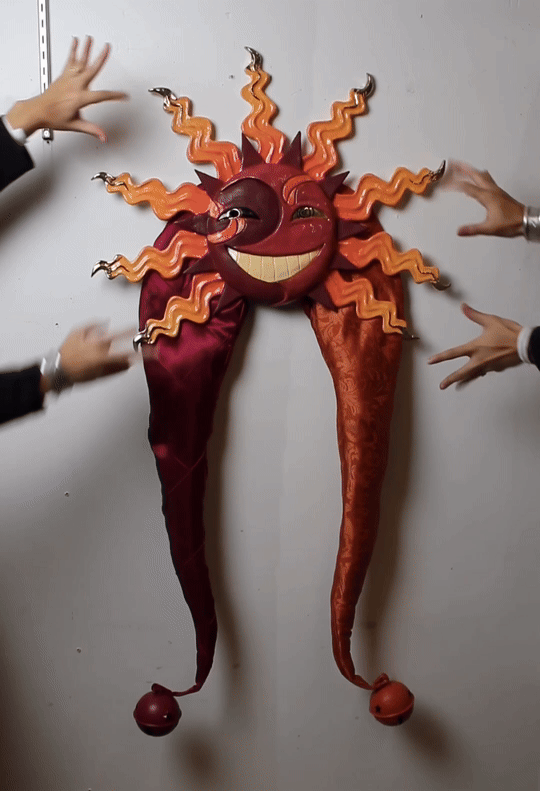
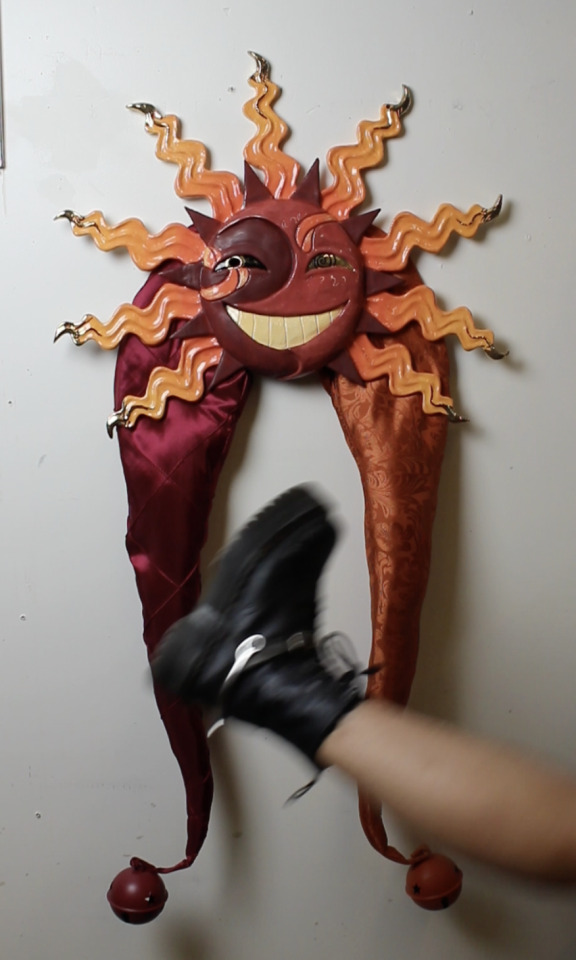

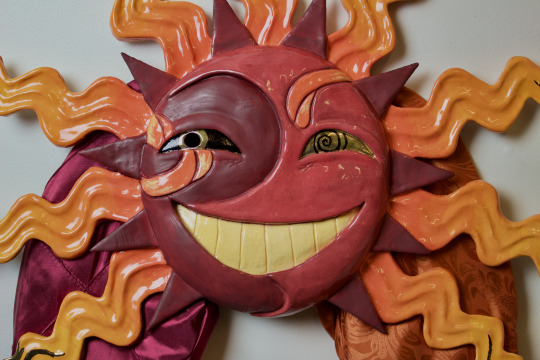
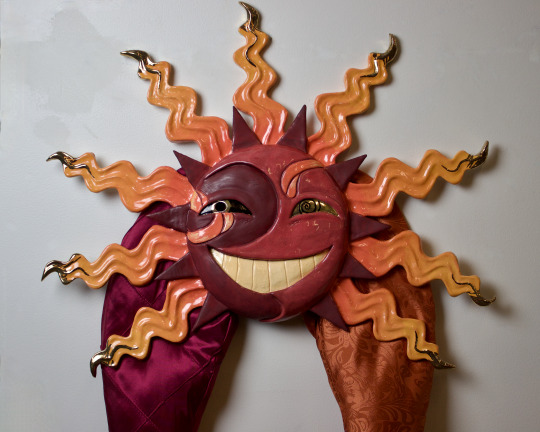

(naku & wall for scale)

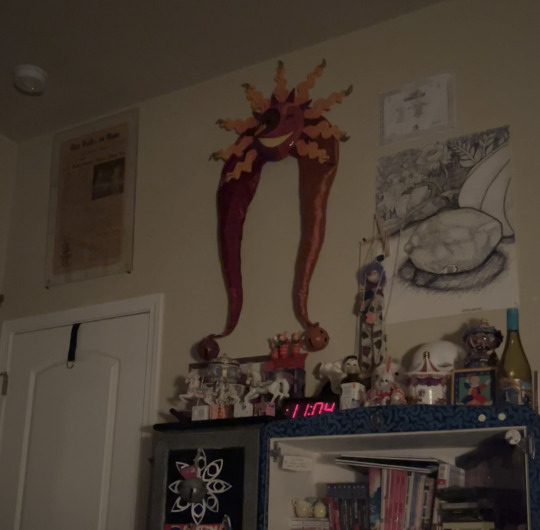
(he's so big guys i have large walls (the top of my head is only slightly above the top of the bookcase beneath him) look at him at the wall it's nuts)
#eyenaku#proudnaku#seriously so proud of this naku please interact with this my magnum opus of porcelain i hate porcelain but i love fool#my prof. encouraged me to make THE REST OF FOOL?? LIKE HIS BODY?? thats so much. i'm not gonna but that was a funny thing to experience#ANYWAYS HI QWILLE IF YOU'RE READING THIS THE TAGS!!#fool is such a guy#thas all! love ur stuff btw#art#pottery#ceramics#mask#masks#decorative masks#porcelain#fool#fool gitm#fool ghost in the machine#ghost in the machine au#fool eclipse#ghost in the machine#gitm au#gitm fool#eyenaku masks#hehe happy fool day#I think the funniest part of making him was the tactical smooch I had to make to save his face it’s a whole thing#clip next.
1K notes
·
View notes
Text
it's really heartwarming & validating to see such a large spectrum of DID experiences under people who have been professionally diagnosed.
i used to fear that my system was too "odd" to ever receive a diagnosis for DID. however, on tumblr, i have met diagnosed systems who:
are introject/fictroject heavy.
have 0 introjects.
were diagnosed as minors.
were diagnosed quite late in life.
experience polyfragmentation.
have very high alter + fragment counts.
have 2 or 3 alters.
use neopronouns.
are transgender or have bodily transitioned.
have no innerworld.
have a complex & vivid innerworld.
didn't know they were a system before being diagnosed.
knew they were a system before seeking diagnosis.
are overt, obvious & cannot mask.
are highly covert & completely secretive.
there is such an array of experiences being shared on this website, & it tells me that there is hope for all of us to receive a diagnosis*, care & recovery help.
*if that is what you want!
#finn🍄.txt#;#🤍#💬#[#systemhood#self dx#prof dx#did system#traumagenic system#actually traumagenic#sysblr#cdd#system#cdd community#system stuff#]
215 notes
·
View notes
Text
Nerdy cultural details about the word "Hashira"
Some details can be hard to pick up without context or in translation. I recently went over a few details about the Hashira's names, Breaths, or symbols, but today I want to focus on the word "Hashira."
To get this out of the way, I use "Pillar" all over this blog because I thought that's what they were called. I was astounded that phrase was not translated, as it is a (somewhat rare) case of a one-to-one translation equivalent. They are the pillars that support the Demon Slayer Corp, after all. The kanji for it (柱) very literally means "pillar" in any modern day Japanese to English dictionary. But since you all know the word "Hashira," let's climb up and see where it takes us!
First, the kanji itself (brought over from China and given the Japanese pronunciation "hashira," based on the existing spoken Japanese language), is composed of 木 for "tree" and 主 for "master" or "main/principal," among other semi-literal or more widely applicable possible meanings in modern kanji dictionaries. However, Prof. Owada Tetsuo, a retired university professor who published an unofficial book of his own Kimetsu no Yaiba interpretations based on Japanese demon slaying folklore, points out that 主 can also be interpreted as a still flame atop a candlestick, and that 柱 (hashira) is a tree that cannot be moved. (I'll continue to use a lot of Prof. Owada's details in this explanation, as well as details I have picked up in other research.)
That makes 柱 closely associated with holy trees found in, or treated as, Shinto shrines throughout Japan. As Shinto is a nature-based belief system, trees are often something that a kami (deity) will inhabit. Keep Shinto in mind, because we're going to focus on that a lot.
Before that, let's finish up with the kanji 柱. According to the first official fanbook, there is an upper limit of nine Hashira because there are nine strokes in the 柱 kanji. (See this dictionary entry for a breakdown of those nine strokes.)
Now that the easy official tidbit is out of the way, back to the Shinto fun stuff and conjecture! We need to dive a bit more into the spoken Japanese language, from which a lot of Shinto terms derive.
For starters, the Japanese language uses counter words for when you say a certain number of beings or objects. You could think of this as "a sheet of paper" or "three rolls of tape." It is an annoying part of starting out your study of the language because there are a lot to memorize based on sizes, shapes, types of animals, etc. Deities also have their own counter word: 柱 (hashira). This goes to show how the Hashira of the Demon Slayer Corp are something more than human, what with how much power they possess.
Now if we think about the pronunciation of the spoken Japanese word from long before a Chinese written character was assigned to it, the "hashi" of "hashira" is a "bridge." Clever ones among you might know that "hashi" also means "chopsticks." But even chopsticks have the same effect as a bridge! They serve as a connection, bridging the gap between you and what was another living thing, that which will become a part of you as your sustenance. "Hashira," as pillars, are likewise something that serve as a connection, in this case, a vertical one. They are that which connect us with the heavens, or in the case of the Demon Slayer Corp, they bridge the gap between the limits of human strength and the inhuman strength of demons.
As another Shinto tie, one of the connections that Prof. Owada and I both made was that there are nine pillars that support the main sanctuary in shrine architecture like that of Izumo Taisha Grand Shrine. Or rather, in the case of at least one of the historical iterations of Izumo Taisha, there were nine groups of three massive tree trunks each, resulting in a shrine over 48 meters in height (see here for photos of how big the remains of those pillars are and how exciting the archaeology is). These pillars give you a sense of awe for just how powerful pillars can be, especially when you have a spread of nine to distribute the weight.
Now, there's more that Prof. Owada and I would both say about how Izumo Taisha also ties in with the "Ubuyashiki" surname or the "yakata" title by which the Hashira address him, but that's a dose of nerdery for some other time.
#kny nerdery#kny reference#kny references#I forget which tag and I'm sticking it in there for the official fanbook bit#otherwise this is what My Research makes possible#thank you My Research#and thank you Prof. Owada's Research even though I think you're stretching too far to make connections#for the sake of talking about other nerdy folklore stuff in a KnY themed book
122 notes
·
View notes
Text
„Nobody leaves this room until we’ve found my ring!“
Oh, great. Ava needs to be at the other end of the campus for her next class in fifteen minutes.
„Is he serious right now? It’s not our fault he lost his stuff.“ Doug, one of the other students dramatically rolled his eyes.
„Oh come on, have some sympathy. It’s probably antique and ridiculously expensive. Just help him find it and we can all be on our way.“
Just five minutes ago Ava was listening to Professor Gadlings lecture about early modern drama when he noticed the lack of his ring. One of the braver students had once asked him about his kind of uncharacteristically flashy ring he was sporting on his left hand.
The professor was known on campus as a very down-to-earth guy, almost suspiciously normal. Wearing cozy and practical clothes he always gave off the impression of a perfect son-in-law. In Ava’s opinion there was still a kind of mysterious aura about him but she never managed to put it into words. Not too much was known about him despite his cheery and social behavior.
It all added to his attractiveness. If one was into middle aged history professors…so basically at least half of the class had a crush on Mister Gadling and Ava surely was a leading member of the unofficial Dr. Robert Gadling fan club. For academic purposes only, of course.
That particular ring however didn’t seem like something the man would buy for himself. It was gold, beautifully carved and had a massive ruby embedded in the center of it.
It was just a touch too flamboyant for their professor that there had to be a story behind it.
But all he would give them as an answer was a sly smile and a cryptic comment about „how Shakespeare would die of jealousy if he could see him now.“
Said ring was now missing. When Gadling noticed his bare finger all hell broke loose.
Running his hands frantically through his hair, pulling it into a tight ponytail only to undo it seconds later. Crawling under his cluttered desk and painfully bumping his head in the process.
For a minute or two it was admittedly funny to watch the man sweat but now Ava just felt sorry for him. If she’d own such an obviously expensive piece of jewellery she would freak out too. Maybe it was an old family heirloom of some kind. The man owned all kinds of weird historic stuff, that much was for sure.
And apparently now they all had to help him find it if they wanted to leave this room anytime today.
So this is how Ava finds herself now on the surprisingly clean floors of lecture hall number five, looking for a shiny piece of metal along with her classmates.
Gadling seems to slowly but surely drift off into panic mode, spurring them on while turning every pocket of his trousers inside out, his hair sticking in every direction like one of the cartoon characters from her childhood. A mad scientist indeed.
“It has to be in this room! Keep looking! I can’t go home without it…and believe me when I say we’re all going to have a terrible night of disturbing dreams if we don’t manage to find it!” What is that supposed to mean, please?
Just as he’s about to flip his desk - yes, the very heavy and very antique looking desk - an unfamiliar voice breaks the chaotic atmosphere.
“Are you looking for something specific, professor? You seem quite distressed.”
And if Mister Gadling appeared ‘distressed’ before he’s outright shocked now.
In front of the old oak door leading into freedom - Ava can’t wait to finally leave this madhouse - stands the most gorgeous and posh looking goth prince she’s ever seen. Damn, those cheekbones alone are to die for, but his voice…dark, soothing, absolutely mesmerizing. The man looks regal even in a place that is anything but. That long flowing coat is a bit much though.
“Oh. You. Are here.” What happened to her eloquent professor?
“Indeed I am, Hob.” Hob? What kind of nickname is that?
“I mean why? Why exactly are you here? It’s just that you never visited before.”
Ava crawls back from under her chair to not miss a minute of whatever the hell this is.
She swears that Gadling - Hob, she remembers - starts to blush like a shy school girl. Who is that man that makes her professor lose his cool?
Meanwhile the rest of the classroom stopped the search for the ring, instead staring without shame at the play in front of them.
“My duties prevented me from visiting one of your lectures. I apologize for that. But you missed something of great value this morning. I thought you might want it back.”
And with that emo king (Ava really needs to find out that man’s name) calmly walks towards her professor, completely unaffected by his nosy audience.
Once he reaches the other man he gently takes his hand, opens it … and places a ring into his palm. Not just any ring, no.
The ring that “definitely has to be in this room”, as Ava recalls professor Gadlings voice. So much for that.
The stranger looks clearly amused at mister Gadlings obvious embarrassment.
“You left it next to the sink after washing the dishes. Then you realized how late you were and forgot to put it back on. I had to stop Matthew from hiding it under his pillow.”
Did Gadling have a cat? That man would surely get a cat and name it Matthew.
Gadling looks as relieved as he looks stressed by now.
“Thank you. I may have overreacted a bit.”
More than a few students agree on that but are too smart to make a comment.
That dark dream of a man fondly tucks a strand of hair behind their professors ear and wow, what’s happening? Ava tries to be as silent as possible to not ruin this moment. Her friends will never believe her.
Apparently Gadling finally found his voice again.
“You came all this way just to…”
“To take your wedding ring where it belongs, husband.”
And with that he places an almost chaste kiss on the other man’s lips and abruptly turns around to leave the - absolutely stunned and silent - room. Everyone is openly staring at poor mister Gadling now. Ava is pretty sure she saw one of the younger students filming or at least taking a picture of the whole thing. She’ll have to ask for evidence.
“Okay listen. None of this ever happened. You saw and heard nothing. Thank you for your help. Goodbye.”
Gadling quickly dismisses his students and almost flees the lecture hall.
Days later Ava still isn’t sure she witnessed a very elaborate fever dream
#I just love to embarrass hob#and I know Matthew isn’t a magpie but the idea of him stealing shiny stuff from dream didn’t leave me alone#he’s a little shit and I love him#hob is also the hottest prof on campus and dream is fed up with all the students dreaming about marrying HIS husband#dream of the endless#the sandman#hob gadling#dreamling fanfic#dreamling#my 2 am writing
147 notes
·
View notes
Text
one line in trimax that's always stuck with me is from chapter 65, right after wolfwood's death. when vash is sticking the punisher by his grave and he says "it was part of his life". that phrasing is so interesting to me. the neutrality of it is one thing that gets me, i think. it was part of his life. for better or worse, whatever it was, the punisher was wolfwood's.
It's pretty easy to think that the punisher might represent violence, the eye of michael, the role of assassin that was forced onto wolfwood, the loss of childhood. but it's not really presented that way, not overtly anyways. we never see wolfwood shun the punisher, he's not conflicted by his use of it. he never considers abandoning it for some other weapon. it's his weapon. he doesn't discard it when he eventually decides to take a more vash-like approach and actually let people live. he pretty easily accepts it as his own, a tool he can use. (to be fair, at least part of that is probably because the punisher is a very good gun.)
the punisher can still represent the harsher aspects of wolfwood's character, the violence he's committed, that he's capable of. that's an important part of his life! and the idea of it as representative of his violent adolescence, childhood that was stripped away, goes along with this - it's literally a cross to bear. but besides showing his past as a burden, i think of the punisher as being a cross of responsibility. when you have a gun you have power, agency - you have a responsibility to make a choice. that's what wolfwood tells vash in chapter 4.
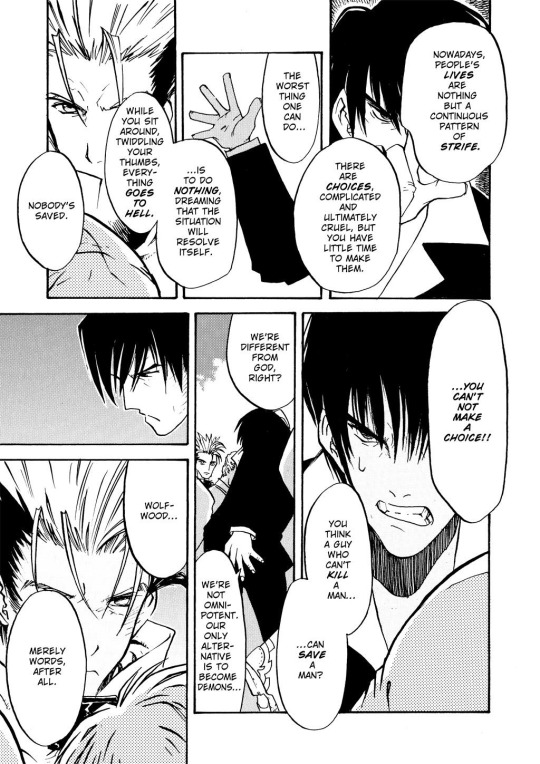
the ability to take a life, the burden of it, is literally his cross to bear. that ability - and that responsibility - was given to him by the eom, literally in terms of the gun, and in terms of his skills. but the eye doesn't think twice about killing people. for them it's not really a choice, a responsibility, it's just a given. but wolfwood can't accept that. he's constantly considering the choices he makes.
so the punisher isn't only a symbol of the eye of michael, of the path that he was forced onto. it's also a way of expressing autonomy. the eye gave wolfwood the gun, but he decides how to use it and what it means. for much of the story wolfwood struggles to decide what to do, he's a very conflicted character. but eventually he resolves to use it against chapel, against knives, to help vash, and protect the orphanage. the gun gives him agency.
so the punisher was part of his life. it was the tool that he used to commit acts of violence, acts that he was forced into, but also the tool he used to break free.
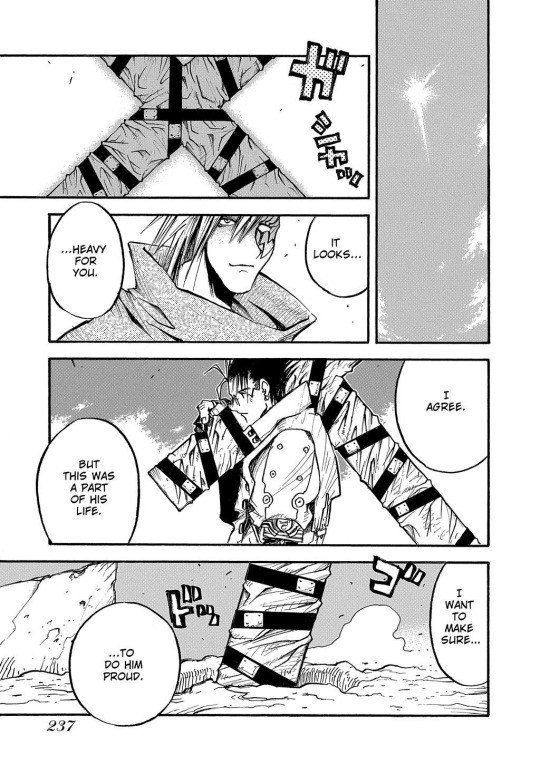
it's heavy for vash, too. he's not exempt from that idea, the idea of responsibility. as wolfwood said much earlier in the story, vash has always been able to sidestep the question of "what do i choose?", because he's only ever given himself one option - everybody lives. and he's always succeeded. but as wolfwood says, "the day will come when you'll have to choose". one day, it's not going to work.
and of course the story progresses, the stakes ramp up, and vash learns more, goes through more, and is pushed to his limits. i think by this point, by wolfwood's death, and maybe because of it, vash has realized that he might have to make that difficult choice in the near future. that's one reason why he wants to "do him proud". he has a lot of reasons to say this of course - to not let wolfwood's sacrifice go to waste, for example. but if we're thinking of the cross as responsibility, then vash is saying he doesn't want to forget the lessons he learned because of wolfwood. wolfwood has always grappled with responsibility, with what the right thing to do is. and the right thing is often not easy. vash hopes that when the times comes for him to make a choice, he'll make a good one, one that does right by wolfwood's memory.
#trigun#trigun maximum#vash the stampede#trigun meta#trigun analysis#i have another post in my drafts abt wolfwood and autonomy so theres some stuff im not getting into but stay tuned#i hope this makes sense...the whole it was part of his life thing...it gets me for some reason#this is just me trying to articulate why#hopefully what im saying isnt too obvious and is actually insightful#this whole post was inspired by one of my art history classes#we were talking abt some of betye saars works and my prof mentioned the idea of weapons as symbolic of power and agency#so ofc i had to apply that to trigun#at that point i was only thinking of the punisher as 'eom = bad' but that just didnt feel right#so then guns...agency...it all came together#seems obvious in hindsight but i just didnt realize#too hung up on guns as violence and violence is bad#but obviously it's more than that#.lieii#.lieii txt#nicholas d. wolfwood#i just realized how long this post is uh sorry guys#i may have repeated myself too much with this one hopefully it's still legible#take a shot everytime i use the word agency or choice in this post#trimax spoilers
428 notes
·
View notes
Note
I am in love with the idea of sugar daddy bakugou, he would have to physically drag me out of bed to class, I set like 5 alarms and then still not go
IT'S ABSURD, like you can't even lie to him abt it either because he has your whole schedule memorized!! You think you've finally gotten away with missing one morning class just to sleep in and cuddle, but NOPE, after one hit of the snooze button he's pulling off your blankets and flickering the lights on and off.
You're like, "can't i just be your housespouse, stay home and do chores???"
And he's frowning, "first you were beggin' me for tuition, now you don't even wanna go???" (i'd immediately get up to argue with him but that's another story)
He is so annoying lmfao. Has an argument for all of your complaints, and will try to slap your butt if you don't get up. And the worst part is that he really does want you to do well !!! and get a degree in case you need to support yourself ever. Good LUCK not feeling guilty and trying to get out of homework, too.....
(and LITERALLY ME THIS MORNING, my alarm rang for an hour and apparently i just did not give enough of a fuck to notice😭😭😭)
#bakugo#youre like 'but i'm tired!!' and he's like 'you got an extra hour of sleep bc i drive you now'#you're like 'my bags not packed!!' and he's already packed it for you (poorly but still)#got dam!!!#it is funny tho the one time he does let u skip and u tell ur prof ur sick#only for them to see you on the hero billboards instagram with him#anyway was thinking abt this on the way home and i thought abt that one 'i'm tired of this grandpa!!'#you when he gets a peak at your notebook and starts trying to explain stuff to u#HELP ME PLEASE#thats u on the phone to kiri#hope this was an ok answer!#caitie things#anon#gen
151 notes
·
View notes
Text
"For all you lonely boys...
I will be president"
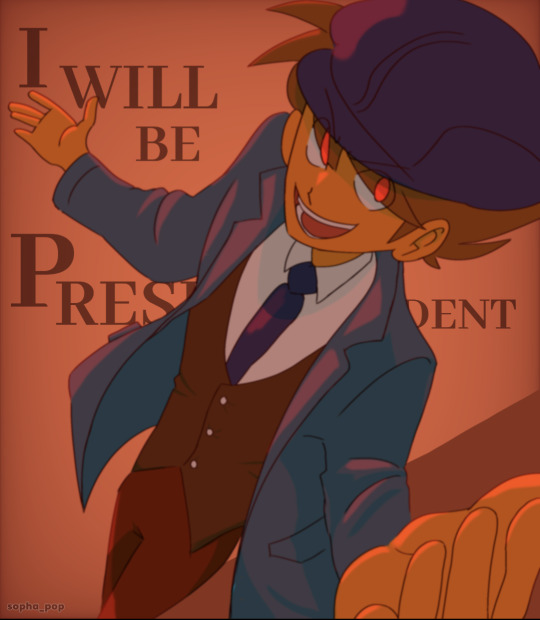
Without blur effect

Og concept and sketch - @prisile
Line art and colors - me :]
#bros really wants to be president smh#heheh this piece was very fun to draw#i have a ton of cool ideas for clive hehehe#stay tuned GIGGLE GIGGLE#professor layton#prof layton#layton series#layton#professor layton and the unwound future#unwound future#unwound future spoilers#future luke#clive dove#clivey wivey#my art#my stuff#art collab#Spotify
93 notes
·
View notes
Text
being autistic and having to deal with bureaucracy is like “sorry for the communication error!” (not my fault even remotely)
#why is my prof all aggro about my not scheduling an exam with the university disability center#bitch i knew the policy beforehand. i didn’t schedule an exam because i simply did not want to take it 2 hours early!#how is it my fault that you didn’t go ahead and put me on the roster to test with the rest of the class knowing i didn’t schedule an exam#with accommodations#he seems actually mad that i wanted to know where to go for the test tonight as if it was my oversight and not his#that’s the policy babe!#if i don’t want an extra long exam i get put in the regular one#it’s literally the rule. disabled student doesn’t choose to use their accommodations -> they do the regularly scheduled stuff#autism#text post
185 notes
·
View notes
Text
Screaming from the crypt (or how the past haunts the present on Midnights)
I know it's been discussed so much since Midnights came out but just.
I love how there is such a clear narrative throughout the album (and perhaps especially on the 3am/Vault tracks). About questioning and regret and choices and coming to terms with all of it. It is one long story about how we're all a mosaic of the choices we make, each one taking something from us and leaving something else in its place.
(And now a disclaimer: I'm looking at this mostly through a narrator/subject lens, and trying not to dive too deeply into real-life events or speculation except for in a general sense. For this purpose I like to look at the body of work as art, like literature, because I find it makes it easier to see the common threads in the different songs and cohesion in the narrative.)
In looking at the 3am+ tracks in particular, it's fascinating how some turns of phrases or themes repeat themselves in different songs, in different contexts. (I'm only focusing on the non-standard tracks because there are too many songs and I'd be here all day but I bet I could do a part two lol.) I know many people have pointed out the parallels throughout her discography already and I’m not saying anything groundbreaking by writing this, but I love how these parallels run through in the same album, because it makes it seem like it's one long story, or at least, one long rumination on many different stories that are coalescing into a single narrative.
Battle (let’s go)
For instance, the one that jumped out at me when I started writing this post the other week was, "Tore your banners down, took the battle underground," in The Great War and "If clarity's in death, then why won't this die? Years of tearing down our banners, you and I," in Would've, Could've Should've. It's a story about staying stuck in the same cycle of reliving trauma and coping mechanisms and bad habits over and over again and fantasizing about how taking the “antagonist” out and gaining the upper hand for good would bring closure (WCS), but the truth is that nothing ever will. All that cycle does, though, is repeat itself in other situations, and in this case pushes someone away the narrator cares for (TGW). The difference is that the imagined battle in WCS is a two-way street in her mind (that is ultimately unwinnable because it was never a fair fight), but in TGW it's one-sided -- she's the one fighting dirty, taking shots, the way she'd been doing in her imagination (or nightmares) all these years. But the person in front of her isn't fighting back the way the person in her mind in WCS would, because their intentions are honourable instead of exploitative.
And that's paralleled in another pair of lyrics from the two songs, "And maybe it's the past talking, screaming from the crypt, telling me to punish you for things you never did," (in TGW) and "The tomb won't close, I fight with you in my sleep," (in WCS). In both cases, the funeral imagery makes it seem like this past event should be dead and buried in WCS, but it keeps rising from the dead, haunting her no matter what she does and in TGW, another (or perhaps the same?) tomb that won't close keeps unleashing new ways to hurt her and in turn the new person in her life. In other words, the trauma from the past continues to bleed into the present.
(Again from a literary point of view, I'm not saying the events of the two songs are linked IRL, but they're fascinating textual parallels on the album as a string of chapters, which is why Dear Reader is so compelling, but that's a whole other essay.)
To keep the battle motif going, there’s yet another parallel, this time between TGW’s "[You were a] soldier down on that icy ground, looked up at me with honor and truth," and You’re Losing Me’s "All I did was bleed as I tried to be the bravest soldier, fighting in only your army.” In the former, the subject is laying down his armour in the war she’s projecting onto him, waving the white flag, and she realizes that she’s about to destroy something if she doesn’t put her sword down too. By the time we get to YLM, the roles are almost reversed; at the very least they’re supposed to be on the same team, but in this case she’s doing all the heavy lifting, fighting for their relationship in contrast to his apathy killing it. It’s also pretty interesting (if not outright intentional) that one of the 3am+ editions of the albums starts with The Great War, where they find themselves in conflict (even if it’s in her head) that ends in a truce, and ends with You’re Losing Me signalling the end of the relationship, evidence that the resolution in the first song wasn’t an ending but merely a ceasefire before the last battle.
Putting the rest under a cut because this is waaaaay too long now ⤵️
(There’s also another metaphor there in The Great War with its battle imagery: World War I, aka The Great War, was supposed to be the war to end all wars, because loss on its scale was never seen before and when it ended, most thought never again would the world embroil itself in such battle, the horrors and implications were so devastating. Two decades later, the world found itself in WWII, with an even larger scope and more horrific consequences, the intervening time between the two a period of festering conflicts and resentment leading to some of the worst acts the world would see. Bringing real life into it for a second, there’s something a little poetic, though sad, about The Great War the song being about a fight that could have ended the relationship that they ultimately resolved and was meant to be evidence of the strength of their love, but so too did it end up being a period of détente, the greater battle coming for them years later. But that is not the point of this post.)
If one thing had been different
Another major theme in these editions is pondering the "what ifs?" of life, but I think it takes on even more significance in the broader context of the album in the lyrics of "I'm never gonna meet what could've been, would've been, should've been you," in Bigger than the Whole Sky and the repetition of would've/could've in Would've, Could've, Should've (I would've looked away at the first glance, I would've stayed on my knees, I would've gone along with the righteous, I could've gone on as I was, would've could've should've if I'd only played it safe, etc.) In both songs, the narrator is mourning an alternate course their life could have taken* and questioning what they could have done differently, in the aftermath of trauma and loss, and the regret that comes with that loss, and with the loss of agency in the situation because ultimately it was never in their hands. In an album full of questions, wondering about the path not taken, or the forks in the road that have led to a different version of your life, it's digging deeper into the contrast of choice vs. fate, action vs. reaction, dwelling on the past vs. moving on. When you're supposed to let go of the past, what do you do when it is holding your future hostage?
(*I know there are different interpretations/speculation about BTTWS which I am not getting into on main. I'm just saying that whatever the song is about, it's grieving something that never came to be. The literal origin of the song is less important to the album than the sense of loss it portrays. Whatever the inspiration is, it's crafted to tell part of the story of Midnights of ruminating over how, to borrow from her previous work, if one thing had been different, would everything be different?)
(Also I was today years old when I realized that the words are inverted in the two songs. Apparently I've been hearing BTTWS wrong this whole time.)
There's also an interesting tangent in the role of faith in both songs: in WCS, the events of the story cause her to lose her faith (e.g. "All I used to do was pray," "you're a crisis of my faith,") and question all the things she felt had been unquestionable until that point in her life (e.g. "I could have gone along with the righteous"), whereas in BTTWS, she questions whether that very lack of faith is to blame for the loss in that song ("did some force take you because I didn't pray? [...] It's not meant to be, so I'll say words I don't believe"). It's like pinpointing the moment her life changed and upended her beliefs (WCS), but as a result then leaving her unmoored in times of crisis because ultimately there's no explanation or comfort to be taken from what she used to hold true before that (BTTWS). The words she once relied upon to guide her have long since lost their meaning, but in times of trouble it leaves her wondering if that faith she once held then lost could have prevented this pain.
(Shoutout to WCS for being Catholic guilt personified lol.)
To keep on with the vaguely faith-y notions, an obvious parallel is the line in Would’ve Could’ve Should’ve about, “I damn sure never would've danced with the devil at nineteen,” and, "When you aim at the devil, make sure you don't miss," in Dear Reader. All of WCS is about her fighting with an antagonist who haunts her, with whom she wholly regrets ever becoming involved. DR could be seen as a reflection on that fall from grace, warning the audience that if you choose to go after the person (or thing) haunting you, make sure you do so clearheaded enough to be decisive. Again, these “devils” may not be related in real life: the IRL devil in DR could be speaking about her naysayers, or Kim*ye, or Scott & Scooter B, etc., meaning not to cross your enemies until you know you can win. But taking real life out of it and looking at it textually, I am intrigued by the link between WCS and DR, so that’s what I’m going with here. And perhaps that’s even the point in a wider sense; there will be multiple “devils” in your life, or threats to your well-being. If you’re going to commit to taking them down — whether it’s an actual person, or the demons inside you that refuse to let you go — make sure you have the right ammo so that they can no longer hurt you. (Of course, one lesson from these experiences is that sometimes you can’t win, and you have to live with the fallout.)
(Sidebar: I know that “dancing with the devil” is a turn of phrase that means being led into temptation and engaging in risky behaviour, as opposed to describing the actual person. Given the religious metaphors in the song, that could very well be/is the intention, particularly when it’s preceded by, “I would have stayed on my knees” as in she would have continued to follow her faith — in whatever sense that means — had she never met this person, which could also be a more eloquent way of saying she would have continued to be live her life in a way that was righteous (even naive) and seen the world in black and white. Either way, it’s a force she wholly rejects. Like I said, multiple devils, same fight.)
Regret comes up too: in WCS, she says, "I regret you all the time," obviously directed at the person who manipulated her and led to her perceived downfall, citing him as the one impulse she wished she'd never followed, because it won't leave her no matter how hard she’s tried. In High Infidelity, she tells the person to, "put on your records and regret me," and on the surface, it’s like she’s turning the tables, painting herself as the one now causing the regret in someone else, the one inflicting the pain this time. Yet the verse preceding it and the lines following it in the chorus depict a partner who is also emotionally manipulative and vindictive like in WCS (“you said I was freeloading, I didn’t know you were keeping count,” “put on your headphones and burn my city,”). It’s not so much that she’s intentionally harming the person (the way the person in WCS does to her), but rather that the venom in the subject’s feelings towards her seeps through; she’s imagining the way he’s going to feel about her when she leaves, hating her just for by being who she is. (There could be another tangent about how in both songs she’s there to be a “token” in a game for both of the men, who play her for their own purposes.) The regret is dripping with disdain. It’s as though she’s picturing how the person is going to hate her for doing what she’s thinking of doing the way she hates the person who first hurt her.
Sadness, unsurprisingly, shows up in a few lyrics. In BTTWS, “Everything I touch becomes sick with sadness,” sets the scene of a person so overcome with grief that it permeates everything around them; they cannot see their way out of it and feel like the fog will never lift. In Hits Different, it’s, “My sadness is contagious,” the result of a breakup where the person’s grief again touches everything and everyone around them, pushing them further in their despair and loneliness. The reason behind the grief in either case may vary, but regardless of the source, the feeling is overpowering and isolating. They may be different chapters in the story, but the devastation is hauntingly familiar. (As is a recurring theme in Midnights as a whole: there are situations and feelings that present themselves at different points in her journey and colour in the lines in different ways along the road. Like revisiting an old vice and realizing the hit isn’t quite the same as it was in the past.)
Death by a thousand cuts
She also writes about wounds on this album, which isn't surprising I suppose given that the whole conceit is that these are things that have kept her up at night over the years. WCS is perhaps the driving narrative on this never ending hurt when she sings, “The wound won't close, I keep on waiting for a sign, I regret you all the time,” suggesting that no matter what she does, the pain of this experience has permeated everything she’s done afterwards. (Not unlike the overwhelming grief in BTTWS, for instance.) Elsewhere, in High Infidelity she sings, "Lock broken, slur spoken, wound open, game token," and in Hits Different, "Make it make some sense why the wound is still bleeding.” Again I'm not suggesting they're about the same events; the line in HI is about a situation where a partner crosses a boundary, hits below the belt, picks at an insecurity (or creates a new one) and treats the relationship like it's transactional, opening the floodgates in turn. In HD, the wound seems to be more self-inflicted, where she's pushed the person away. (Over a situation real or imagined she feels she needs distance from.) But again, something has picked at her like a raw nerve, and just like in the past, she's hurting, even in a different time and place and person. Almost like the wounds of the past break open over and over again to create new scars. If one were to extrapolate further, it wouldn’t be the biggest leap to wonder if the wound open in WCS, then torn apart in HI makes the one in HD hurt even more.
(I once wrote a post about how I think as time goes on, WCS is going to turn into one of those songs that will be found to drive so much of her work, because it’s just… kind of the unsaid thesis statement of so much of her songwriting.)
Another repeated theme is that of the empty home and loneliness. In High Infidelity, she sings, "At the house lonely, good money I'd pay if you just know me, seemed like the right thing at the time," painting a picture of someone who may have everything they'd want to the outside world, but in reality feels metaphorically trapped in their home (or at least alone amidst abundance), a symbol of a relationship gone sour and a failure to build connection. She just wants someone to understand her, want her for her, but as she's written earlier in the song, she's just a pawn in the game, a trophy from the hunt. Home, in this case, is lonely, isolated, an emblem of her fears. In Dear Reader, she continues this thread, then singing, "You wouldn't take my word for it if you knew who was talking, if you knew where I was walking, to a house not a home, all alone 'cause nobody's there, where I pace in my pen and my friends found friends who care, no one sees you lose when you're playing solitaire." It's the same idea, admitting to listeners that the gilded cage she lived in kept her distanced from her loved ones and real connection, keeping her struggles close to the vest but feeling desperately lonely amidst her crowning success. She's pushed people away and it may have felt like the right thing at the time, but in the end maybe felt like she was trapped. And when you push people away, eventually they take you at your word and stop pushing back; you’re a victim of your own success at isolating yourself. What starts out of self-preservation then further perpetuates the underlying problems.
(There's another interesting link about "home" also feeling unsafe with HI's "Your picket fence is sharp as knives," which further leads into the theme of marriage/domesticity feeling dangerous, which is a whole other thing I won't get into here because it's another discussion and may derail this already gargantuan word salad.)
In a slightly similar vein, we have the metaphor of bad weather for a rocky road or unstable relationship, in High Infidelity again with, "Storm coming, good husband, bad omen, dragged my feet right down the aisle" and You’re Losing Me’s "every morning I glared at you with storms in my eyes.” They aren’t speaking of the same situation or even same kind of breakdown, but it is pretty interesting how the idea of clouds/storms/floods/etc. play such a role in Taylor’s music to signal depression, apprehension, fear, uncertainty, etc. In HI, I think the “storm” coming is the looming threat of commitment to a partner who makes the narrator uneasy (if not fearful). In this case, the idea of making a life with this person is not one that incites joy or comfort, but instead makes the narrator feel that dark times are ahead if she continues down this path. Perhaps in some way, the “storms” in YLM have made good on the threat in HI in a different way; it’s a different home, a different relationship, but the clouds have settled in regardless, and some of her fears have come to fruition in ways she did not expect. The person she once trusted no longer sees her or her struggles (or worse, doesn’t care), and the resentment and pain build with each passing day.
Coming back to heartbreak, one of the obvious "full circle" moments is the beginning of a relationship in Paris, where she says that, "I'm so in love that I might stop breathing," clearly enthralled in a new love that allows her to shut the world out and grow in private, capturing the all-encompassing nature of the relationship. This infatuation has consumed her in the most wonderful way (in contrast to the sorrow of some of the previous songs), and it feels like a life-altering (or even life-sustaining?) force that is so strong she may forget what it’s like to breathe. (Metaphorically speaking, of course.) By the end of the album, though, in You're Losing Me, that heart-stopping love has become a threat: "my heart won't start anymore for you." In the former, her racing heart is full of excitement, but by the latter, her heart has given out completely under the weight of the pain she bears. (YLM is full of death/illness imagery which I already wrote about awhile ago so I won't hear, but needless to say that song deserves its own essay for so many reasons.) She's gone from the unbridled joy of the beginnings of a relationship to the unrelenting sorrow of its end, two sides of the same coin.
Love as death appears elsewhere in the music too, for instance, in High Infidelity’s, “You know there's many different ways that you can kill the one you love, the slowest way is never loving them enough" and You’re Losing Me’s “How can you say that you love someone you can't tell is dying? […] My face was gray, but you wouldn't admit that we were sick.” Though not completely analogous situations, they both tell the tale of one partner’s apathy (or at least denial) destroying the other. In the former, the partner’s actions (or inaction) are more insidious, if not sinister; in the latter, the lack of momentum (or admission of a problem) is passive. In both cases, the end result is the narrator’s demise; it’s a drawn out affair that chips away at her morale and her health and her sense of self. (Breaking my own rule about bringing in alleged actual events into the discussion, but the idea that the relationship in High Infidelity, which was obviously fraught with unease and even fear, ended in a similarly excruciatingly slow and hurtful death by a thousand cuts as the relationship in You’re Losing Me almost did at that time must have been so painful. It almost feels like YLM is wondering why what used to be a source of light in her life was mirroring a situation that caused her such pain in the past.)
From the same little breaks in your soul
I said early on that part of what is so compelling about Midnights is that it feels like an album about ruminating — on choices, on events, on people — and the two final “bonus” tracks of the album depict that as well. In Hits Different, she sings that, “they say if it’s right, you know,” an ode to the confusion of a breakup and struggling with the aftermath of calling it quits. It’s a line that has always intrigued me, because the typical use of the phrase is in the sense of, “you’ll know when you meet the one,” but here it seems to have a double meaning, a reassurance perhaps from the friends (who later on tell her that "love is a lie") that she’ll know if she’s made the right decision in calling it off, but could also be her wondering if the relationship is right, she’ll know, and want to reconcile. In the final bonus track, You’re Losing Me, she sings, “now I just sit in the dark and wonder if it’s time,” this time leaving no doubt about the dilemma she faces, though it’s no less fraught. She’s wondering, perhaps for the last time, if now is finally the moment to end the relationship for good. They say that if it’s right she’ll know, and now she’s wondering if that feeling inside her (that once told her her partner was the one, which is why it hit differently), is telling her that it’s time to go for good. Wait Alexa play “It’s Time To Go.” These are not only the things that keep her up at night, but the things that play over in her mind like a film reel in her waking hours.
Midnights as a whole is a deeply personal album, as is most of Taylor's work, but the 3am+ edition tracks seem to dig even deeper to a lot of the issues raised on the standard album. Almost like the standard tracks are the things she wonders about on sleepless nights, but the bonus tracks are the things that haunt her in the aftermath. The regret, anger, sadness, grief, relief, even joy— they’re the price she pays for the memories she keeps reliving. Midnights might be the most cohesive narrative of all her albums, and really does feel like we’re watching someone work through her journal over time, stopping short of outright naming those giant fears and intrusive thoughts (except for when she does) but making them plain as day when you connect the songs together, and perhaps never more clearly than in the expanded album. It’s incredible how the songs stand on their own to relay a specific moment in time, but that they are also self-referential to each other (whether thematically or overtly) to weave a larger web over the entire work. We’re so lucky as fans to have these stories and to keep peeling back these layers as time passes. (And my literature-analysis-loving ass loves her even more for it.)
This is obviously by no means an exhaustive list, and I know there are more parallels and probably even stronger links (particularly when you add the standard version into the mix), but these were the ones that particularly struck me and I’m just glad I’ve had a chance to sit with this and think it through. ❤️
#writing letters addressed to the fire#me thinking too hard about taylor lyrics#taylor swift#midnights#long post#lyrics analysis#song parallels#Gabby this one is for you friend <3#here goes nothing#Happy Friday or something idk!#(also i know i said there are things i wouldn’t discuss on main but my dms are open lol)#this is not as structured or well plotted out as I wanted it to be#and turned out to be more stream of consciousness than legit essay#but whatever at least i got my thoughts out there and it can release some plot of land in my brain for other stuff to think over lol#If anyone ever reads this thank you! And I’m sorry?#The best compliment i ever got in school#was when we were doing an analysis of a poem in English lit in college#And i brought something up casually#and my prof went ‘I’ve been teaching this class for eight years and that’s the first time anyone’s ever brought it up like that’#’and that just blew my mind’#and i was like ‘who me?’#so that’s all you need to know about me lol#Midnights: The Great War#Bigger than the whole sky#bttws#Midnights: Paris#Midnights: high infidelity#would’ve could’ve should’ve#Midnights: dear reader#midnights: bigger than the whole sky
83 notes
·
View notes
Text
Before the semester kicks off and murders me, @disniq asked for my essay on Jason Todd and hysteria. So, without further ado, here is an actual essay (fucking dissertation) because I refuse brevity. It is extremely long. I’ve split it into sections so you can find the section header and read what you want. This does not encompass all the narrative trauma themes and lived experiences that this boy holds, just specifically hysteria.
Jason Todd, The Hysteric & Bruce Wayne, The Batman
I think it’s a common reading that Jason Todd is girl-coded and the patron saint of victims, at least within the circle that I’ve fallen into within this fandom. There are plenty of meta discussions on why those readings stand, so I’m not going to reiterate them. A pillar of him being girl-coded and someone trauma survivors have latched onto as one of our own has to do with being written in the context of hysterical femininity. And let me just say, I don’t think that writing was done in a way that he was intentionally coded as hysterical, but it is a function of our patriarchal society that this coding was used on him albeit without the explicit purpose of writing a hysteric story.
For the purpose of this post: the word woman includes ciswomen, transwomen, and any person who is socially positioned as a woman regardless of gender identity. I include the positionality here because anyone can experience misogyny and sexism depending on the perception of the perpetrators either interpersonally or systemically.
The History and Context of Hysteria
To understand the context, we have to look at the history and oppression of hysteria. Hysteria (in the modern context of psychology) emerged in the nineteenth century and is difficult to define by design and often applied to traumatized, unruly, and broken women. The main patriarchs who contributed to hysterical study were Jean-Martin Charcot and Sigmund Freud. I only mention this because it’s important to know their names moving forward for any of this to make sense. The beginning of this started with Charcot literally putting women whose lives had been marked by rape, abuse, exploitation, and poverty on display in his Tuesday lectures (which were open to the public) to show his findings on hysteria. This was actually seen as restoring dignity (fucking yikes) to the women because before Charcot these hysterical women were cast aside and not treated at all. In Charcot’s work, the women’s speech was seen as simply “vocalization” and their inner lives, their stories, their words, were silenced. After hearing a woman cry for her mother during one of the public sessions Charcot remarked, “Again, note these screams. You could say it’s a lot of noise over nothing” (Herman).
This led to Freud, Charcot’s student, wanting to surpass his teacher by discovering the cause of hysteria. This was disastrous. Freud started with listening to the hysterics. In doing so, he learned and believed them about the abuse, rape, and exploitation of their pasts. He then published his work and gave a lecture on it. The work rivals even contemporary psychological work on trauma in it’s level of compassion, understanding, and treatment of survivors. However, he was then labeled a feminist (this was all happening during the first wave of feminism) and professionally ostracized. How in the world could these aristocratic French men be sexually abusing their wives, sisters, and daughters??? Insanity, truly. And... This always fucking gets me. He recanted his work and then told his patients they all imagined it because they wanted to be sexually abused by their husbands, brothers, and fathers. This set back the study of trauma by literally a century. One colleague called his work “a scientific fairy-tale” simply because he had the audacity to believe victims. Also, I want to point out that the famous hysteria case during this time was the case of Anna O and she was ultimately villainized by the entire psychological community for going into crisis after her care provider abruptly ended their therapeutic relationship after two years of DAILY sessions.
Anyway. We can see how the power of these men over vulnerable women silenced, pathologized, villainized, infantilized, and used male ‘logic’ to completely destroy their credibility and lives under the guise of care and hysteria. Even when credible men lend their expertise and voices to the victims, their voices are silenced. This particular iteration of hysteria lasted over a century, and we are still dealing with the consequences of these actions and ideas within our social construction, medical and mental health care, interpersonal relationships, and more. Patriarchal pillars such as hysteria don’t die. We saw it move from hysteria to schizophrenia (which used to have the same symptoms of hysteria before the diagnosis changed in more contemporary psychology) after this which led to widespread lobotomies and electroshock therapy (my least favorite case of a lobotomy being done is on a woman who was diagnosed with LITERALLY ‘narcissist husband’) to depression in the 40s-50s with the over prescription of benzodiazepines to house wives to keep them in a zombie state (these prescriptions were sometimes double and triple what we take today with the intent of medical catatonia). In my opinion, as well as other counselors within the feminist therapy theoretical orientation, we are currently seeing it with the emergence of borderline-personality disorder. Think about how BPD is treated and demonized for a second. I professionally know therapists who refuse to work with BPD clients due to this villainization and just fucking gross perception of victims.
These are just the highlights, but it shows the history of hysteria. There have been centuries of women being marked as hysterical and the cures have ranged from lobotomy to bed rest (which sounds not so bad but read the Yellow Wallpaper and get back to me on that one). While the Yellow Wallpaper is fictional, the life behind it was not. After the traumatic birth of her child the author, Charlotte Perkins Gilman, was remanded to bed rest by the authority of her husband and doctor. Within the sphere of medical control, hysterical women are often treated as children while their doctors make decisions for their mental well-being without consulting them, or they hide the truth of their procedures for “the woman’s own good” and because “she’s hysterical and wouldn’t comprehend the logical need for this.” She then had a mental break due to the treatment. Again, we see hysterical women being silenced, infantilized, discredited from their own experiences, and under the narrative control of male logic and voices.
Hysterical women have often historically been seen as beneath men, except for when they’re dangerous. Listening to victims is inherently threatening to the status quo because all trauma comes from a systemic framework. The framework that upholds patriarchal power. It’s easy to see why that would be seen as dangerous to powerful men. We saw this with the European witch genocide in which oppressed women were targeted and wiped out under the excuse of what was considered women’s work. (Before this time, witchcraft wasn’t tied to any religion and was mostly just seen as women’s work. It was targeted specifically to have an excuse to persecute widows, homeless, disabled, and vulnerable women who no longer had men to reign over them during a time of political unrest and scarce resources). This time period saw hysterical and traumatized women demonized as dangerous, evil, immoral, hypersexual, and supernaturally wily. A threat to the moral fabric of society.
(Interesting history side note: this caused the view of women’s base traits we have today. It stemmed from the Victorian era that came after this time period in which women learned if they behaved a certain way, they would be spared the stake. For example, before the witch trials, women were actually seen as the ones with unsatiable sexual appetites, something we culturally prescribe to men now.)
Notice how none of this has to do with the actual abuse that happens to the women, but instead the labeling and treatment of women when they are already showing the symptoms of abuse, trauma, control, exploitation, and rape.
Jason Todd, The Hysteric
So, how does this relate to Jason Todd? To say that Jason has experienced trauma would be an understatement. Extreme poverty, loss of parent to death and addiction, loss of parent to the justice system, parental abuse, manipulation, witnessing violent crimes, witnessing the aftermath of sexual abuse and assault, arguably (not explicit in the text) his own sexual trauma, witnessing the dead bodies of victims, a violent death, and subsequently a violent resurrection. There’s also an argument to be made for being a child soldier and how that is romanticized up until he dies, but the text does not treat this as traumatizing.
Now, I’m not going to dive into the trauma he experienced. The purpose of this is only to look at how he’s framed as hysterical in the narrative, and as I stated, hysteria was a word slapped on women after they tried to talk about their trauma or exhibited symptoms (or were just unruly women). Jason does embody many facets of the victim experience and this is just one of them.
Feelings vs “logic” - Firstly, it is really hard to talk calmly about things that you carry, your experiences, your trauma, and things that specifically harm you. It is easy to talk calmly about things that don’t. This is why there is an abuse tactic of gaslighting or silencing victims by framing their very real reactions to harm or their triggers as abuse, this is known as “reactive abuse.” This tactic is also employed in oppressive settings where the privileged group will often default to ‘winning’ a debate by being able to remain calm while the marginalized group whose life, personhood, etc is being harmed by the things being discussed and are unable to have a sterilized, emotionless debate.
Both of these settings fit Jason nicely within the moral context of vigilante comics. He fought back, he didn’t lay down, and he will do what he deems as necessary to protect himself and others from his fate. This, however, is framed by Bruce and others as being just as bad as his murderer or even just as bad as Joe fucking Chill. To put this in perspective of a real world equivalent. Combine every billionaire on this planet into one person and instead of their shitty business practices murdering people, they did it with their own two hands. And due to their resources and political power, they would never, ever stop killing or be reasonably contained. More people would die with absolute 100% certainty. Would killing that one person make you equally bad as that person or violating the sanctity of life? That’s the moral question that Bruce puts onto Jason. While the moral question inherent to Jason is actually, is there a line worth crossing to provide reasonable safety (for yourself or the nameless community)? There is actually a difference between those two questions and the reactive abuse framing is certainly a choice. Also, it is funny to me that a man with the amount of power Bruce has (and frequently misuses) can lecture a murder victim on the misuse of power and morality. Are we supposed to be agree with his stoic, philosophical lecturing to a marginalized, abused, murder victim? (yes, we are). Bruce leverages (personal) philosophy against victim’s voice for their own safety, and take a wild guess which one is framed as logical and reasonable.
Jason’s morals come secondary to Bruce’s philosophy in a universe where there is still harm being done (but it’s an acceptable harm). Why is killing the line? Bruce is regularly destroying families and lives by feeding them into the prison industrial complex while supporting it with his whole chest. Or he’s disabling and seriously maiming people with the level of violence he uses.
Crying - Throughout the entire story of Under the Red Hood, we never once see Bruce emote while interacting with Jason outside of tight grimaces. With the exception of the shock he shows at the Joker’s life being threatened, which... Okay, suuure. We never see him cry during any of their interactions, but we do see Jason cry. Specifically, we see him crying when he’s at his most emotionally vulnerable and physically dangerous to the toxic male power fantasy. This kind of vulnerability is rarely shown by male characters, and when it is, it’s usually done with a mist of a tear in their eyes or their face is hidden. There are a few narrative devices that allow men to cry, but they are the exception rather than the rule. Usually, it’s to play for laughs, infantilize, or emasculate. Here, we see Jason combine the violence of a bad victim, bucking the system of power, and fully crying. Just slide right into that hysterical coding like a glove. Jason often shows his feelings entirely. Time and time again, the readers have seen Jason have breakdowns, cry, and be overcome with grief. This is tied to his portrayal as hysterical and unstable in the narrative, but in actuality it shows his capacity for love and how vastly impactful his death was.

This fits nicely with the next point that Jason fits into the hysterical box. Love is framed as one of his key faults. A son reaching for his father.

Love - One of Jason’s defining features is the amount of love and compassion he holds. He’s willing to put up with any treatment, shoulder blame, and sacrifice himself for others to almost an unhealthy degree. However, this doesn’t extend to what he defines as his baseline safety. This one line of safety is the one thing that can’t be crossed, even with all of the love he feels for his father. He desperately wants to feel connection, have a family, and be loved in return with the same unwavering ferocity love that he gives. This is such a fucking key part of the victim experience, especially victims of childhood trauma. The desperation to just be chosen. He’s raw and honest with his reasonable expectation for love to provide safety for him and that is framed as hysterical, needy, unstable, naive, and fucking childish. Victims know what they need to have safety, and this framing as Bruce knowing what’s best for Jason and literally giving a cold shoulder to his needs is disgusting.
Less than - Jason is portrayed as less powerful than Bruce even though they have similar expertise. There are so many instances of this that if you just open any media they both appear in, you can close your eyes, point, and land on an example. It makes me die laughing every time I remember that the Arkham games made Jason just one inch shorter than Bruce. Like, they can’t even be the same fucking height, that’s the level of insecure masculinity surrounding this relationship. Jason cannot and will never be able to be on par with Bruce because of his hysterical femininity and the power of Bruce being the self insert for the toxic male power fantasy. This power dynamic applies to the other batkids as well, but specifically in Jason’s case there is an element of hysteria. The reasons change because he’s so inconsistently written but usually he can’t surpass or even meet a stalemate with Bruce because he’s too emotional, he’s unstable, traumatized, and simply Bad. It’s even explicitly stated by Alfred in Under the Red Hood.
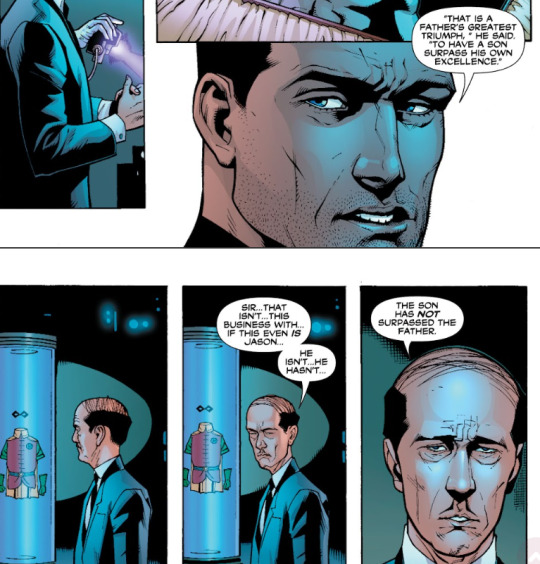
Victim blaming - Jason deserved to die because he didn’t follow orders. Jason deserved to die for not following his training. Jason deserved to die because he was an angry Robin (oh no a child had an appropriate reaction to sexual violence). Jason deserved to die for being human.
Infantilization - Jason is repeatedly infantilized in contrast to Bruce. When given the ultimatum at the end of UtRH, Bruce speaks to Jason like a child, or a bad dog. Ordering him to do things like, “enough!” or “stop this now.” Bruce knows what’s best for Jason (and for everyone in the entire world), we should really just take his word for it and not the victim’s. Imagine staring at a 6 foot wall of a man and scolding him like a child. Beyond that, as mentioned above, his views of love and safety are framed as childish. Even though they are actually leaning more toward collectivism rather than the rampant individualism that Bruce so strongly defers to. (also, just a side note, collectivistic methods in healing from trauma is actually the only scientifically reliable way to heal. Every other method has absolutely abysmal results and higher rates of relapses.)
Silenced and Safety Villainized - Jason is silenced in his own story, acceptable and honored when he was dead and met with vitriol in life. All of the love given to him as Robin turns to ash as soon as he collides with Bruce’s power and morals. I think any survivor can relate to the experience of being told that what happened to them was a long time ago and it’s time to move on. Or even that they’re leveraging their own safety to get what they want in a manipulative way. Regardless of whether or not there was any accountability or justice for the harm done to them. Alfred asks Bruce if he should remove Jason’s memorial in the cave like two seconds after learning of his resurrection because Jason’s methods of securing safety for himself and using his own voice to define his story. Bruce was able to tell Jason’s story when he died. He was able to memorialize, grieve, and ultimately define Jason’s story because Jason wasn’t there to speak for himself. When Jason does speak for himself, he is villainized and literally stripped of his past significance as Robin (or a good victim) by Alfred within seconds. This is reflected in real life with adoptee advocates speaking about how adoption is unethical/harmful/traumatizing and subsequently being framed as ungrateful, selfish, etc. They were little perfect victims without voices before they grew up and could speak for themselves.
Erased - Gestures at the entirety of how Jason is either talked about or completely erased during the 90s Tim Robin run. He wasn’t convenient to talk about, as victims rarely are. This also ties into how Steph’s death was erased and Babs was written like she “won” at trauma by simply... beating it???
Dangerous - Jason is framed as threatening the basic fabric of society (in a story with vigilantes this is hard to do, so they have him oppose the no-kill rule, and then doubled down on Bruce’s characterization of no-killing). Anything that bucks the status-quo is usually marked as villainous in mainstream vigilante/superhero comics, but this is a step beyond that into the interpersonal and political sphere. Hysterical women are often framed as dangerous, villains, snakes, and treacherous (the other side of this coin is weak, pathetic, and pitiable) because they are victimized and then have the audacity to do something to the system about it. Whether that be the system of their immediate families or the political sphere. I don’t think it’s a coincidence that Jason was paired with Talia in Lost Days to hammer this point home to the reader. It could’ve just as easily been anyone with access to the Pit that rescued him, but no, we had DC’s favorite brown, treacherous, venomous, female punching bag.
Bruce Wayne, The Batman
Bruce fits well into the father, enforcer, and logical man slot in Jason’s hysterical story. There is a history of ownership throughout women’s history when it comes to their subjugation to men. Women actually couldn’t be put on trial before the witchcraft genocide because they weren’t seen as legally a person. Their male owner would be put on trial instead. Women would go from being owned by their fathers to their husbands after entering marriage, the most dangerous woman being one who isn’t owned (orphaned, widowed). Bruce does treat (and even thinks) about Jason like he’s something that he owns. He’s his protege, his son, and his responsibility.
The narrative function of Bruce as a perpetrator in Jason’s story.
“The perpetrator asks the bystander (reader) to do nothing. He appeals to the universal desire to see, hear, and speak no evil. The victim, on the contrary, asks the bystander (reader) to share the burden of pain. The victim demands action, engagement and remembering” (Herman).
Bruce does remember what happened to Jason. He keeps a permanent memorial to his dead son. However, this doesn’t translate into any kind of tangible action. He doesn’t do anything to actually stop the murderer who took his son’s life and he continues to throw child soldiers at the problem of crime (how many children have died for the sake of his no-kill rule at this point?). When met with the reality of his inaction, he fits into the perpetrator’s role like a glove:
“In order to escape accountability for his crimes, the perpetrator does everything in his power to promote forgetting. Secrecy and silence are the first line of defense... If secrecy fails, the perpetrator attacks the credibility of his victim. If he cannot silence her absolutely, he tries to make sure that no one listens... From the most blatant denial to the most sophisticated and elegant rationalization... One can expect to hear the same predictable apologies: it never happened; the victim exaggerates; the victim brought it upon herself; and in any case it’s time to forget the past and move on. The more powerful the perpetrator, the greater his prerogative to name and define reality, the more completely his arguments prevail” (Herman).
I think it is simply fact at this point that Bruce is the head patriarch in Gotham if not, arguably, in the entirety of DC. That level of power in the narrative cannot be ignored, especially when faced with the very real, screaming voice of a victim that Bruce uses all of that power to silence. Bruce, because of his status as patriarch, default protagonist, and self-insert for the toxic male power fantasy, has the ultimate power to name and define reality. Especially to the reader. Bruce doesn’t deny what happened to Jason, because that’s physically impossible to do. But what he does do is ensure that no one listens to Jason, discredits him, and rationalizes his own inaction, actions of violence towards Jason, and victim blames.
Here’s Bruce using the most base form of denial and victim blaming:
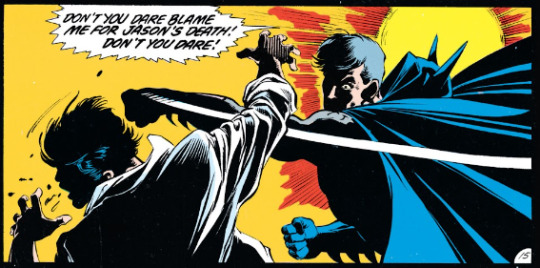

After this panel, Bruce also revokes Dick’s access to his childhood home simply for asking a question.
This theme extends to other members of the batfam because of Bruce’s narrative power over them. It’s why we can’t have Dick, Steph, Babs, or even Damian step in and relate to Jason’s trauma or vindicate him. Even when we, the readers, can see parallels and wonder why these conversations or bonds aren’t forming. Jason HAS to be a lone wolf because he is hysterical and a threat to the system of power. This also shows why most of his runs in group settings outside of the batfam fall apart or fall flat. If he was humanized by any other character or had his trauma validated in any actionable way, it would be recognizing the failure of the toxic male power fantasy. The readers are not supposed to see the flaw in this system that allows the bodies of children to pile up and sympathize with one of their voices. It would be a crack in the system of power that exists not only in the source material, but very much within our real world.
Side note: Jason is allowed to interact with others in a wholesome and validating way when he no longer threatens the systemic power of Bruce. When he is silenced by the writers and plays the “nice victim” (like Babs does), he is allowed connection. Only when his healing is done in a way that doesn’t demand action and is only his personal responsibility (gotta love the rampant individualism). If he is hysterical, demands action, and asks for someone to be held accountable for his death, he is shoved away into a lone wolf box. Examples: Gotham Knights (from my very basic understanding, I haven’t played the game, only seen play throughs) and WFA. Victims are acceptable if they do their healing in a neat little box and stay there, but hysterics are the ones who step outside of that box.
Red Hood, The Political Voice of Hysteria and Trauma
Red Hood is deeply political in terms of hysteria and trauma. Herman stated that victims and those that authentically care for them or listen to them intently (whether that be interpersonally, clinically, or professionally) are silenced, ostracized, and discredited. Survivors need a social context that supports the victim and that joins the victim and witness in a common alliance. On an interpersonal level this looks like family, friends, and loved ones. However, trauma is systemic and the social context mentioned above must also be given on a wider social scale. For this to be done, there had to be systemic change and political action. Jason had the interpersonal social support and witnesses to his trauma ripped from him by Bruce. So, we see him move onto a systemic level of addressing trauma in his own political way. He literally cannot escape Bruce and this constant trigger because of Bruce’s philosophy and just... fucking power to define reality... being re-enforced constantly in DC no matter where he tries to go. So, he tries to heal by taking the systemic issue of perpetrators who cannot be held accountable or have fallen through the cracks of accountability into his own hands in a very personal way. A one man political movement.
Whether his methods are moral or ethical doesn’t really matter in the overall framing him as hysteric. He simply has to be opposed by the male power fantasy in some significant way. This shows that the goals, needs, and work towards victim’s and the marginalized’s freedom is dangerous, doomed to fail, and ultimately unethical if the victim is framed in a villain light instead of the more pathetic/pitiable iteration of hysteria.
You can see how this is not only problematic but also reflects the real world values instilled in arguments against human rights movements (which are intrinsically tied to victims rights). Defunding the police is dangerous, the MeToo movement is dangerous, abolition is dangerous, trans rights are dangerous, etc etc etc. Think of the victims voices tied to each of these movements and how they are integral to the real change offered by these political movements. You can’t have human rights violations without creating victims. And you can’t have political movements surrounding human rights without listening to victims.
We can also see how the individuals within these movements are ostracized, villianized, and often silenced (sometimes ultimately silenced with death) because they rally against the systems of power that victimized them. The framing of traumatized, vulnerable people as hysterical is integral to upholding the system of power that traumatizes and harms them.
A popular comic book movie adaptation that highlights the importance of Jason’s hysterical framing and how it impacts the political narrative/how he is written is V for Vendetta. To be fair, it received an insane amount of backlash by conservatives (not within leftist or liberal spaces) for V’s methods in over throwing fascism, but only because of the movie’s release date being so close to 9/11. V and Jason have many parallels, it’s only the lack of hysterical framing that makes V more palatable to the viewer. We are told, not shown through behavior, that V is traumatized by his past and he does not pick a fight with the protagonist that functions as a toxic male power fantasy. He is the protag, with his version of Bruce being men who are not framed in a sympathetic, heroic, or relatable light.
Additionally, there is literally an unemoting mask standing between the viewer and V, whereas Jason takes off his helmet to allow the reader to see every aspect of his trauma and pain. V readily dehumanizes himself into an idea, rather than a person. Whereas Jason screams to be seen as a person in a very hysterical way. So, we can see how the framing of Jason as hysteric against the logical, heroic man greatly impacts how the audience reads him when contrasted by a very similar political story/character who uses similar (and arguably more violent) methods to meet his ends. (This just made me realize that I would die for a Jason adaptation written by the Wachowski sisters).
Jason’s work as Red Hood is seeped in leftist, victim, and community centered politics. His portrayal as a hysterical antagonist (at best an anti-hero) is rooted in misogyny and upholding patriarchal, capitalist, and the prison industrial complex systems of power. He is the righteous embodiment of “the personal is political” for victims. Even his Robin run draws attention to and shows correct, angry reactions to the system of patriarchal power in sexual violence.
Patriarchal Writing and Enforcement
Jason is girl-coded and hysterical because he’s supposed to be emasculated, discredited, and disliked by the reader. He serves the narrative function of boosting the toxic male power fantasy of Bruce and in doing so, the writers use one of the oldest tropes in the book (one that we have all subconsciously been taught since birth) to get the reader on their side. Make him a hysterical woman.
References: for anyone interested in furthering their understanding of any of the concepts mentioned above and to, you know, use sources for my own writing.
Barstow, A. Witchcraze
Bondi, L., Burman. E. Women and Mental Health: A Feminist Review
Freud, S. The Aietology of Hysteria
Gilman, C. P. The Yellow Wallpaper
Herman, J. Trauma and Recovery
Ussher, J. The Madness of Women.
Van der Kolk, B. The Body Keeps the Score
Wilkin, L., Hillock, S. Enhancing MSW Students’ Efficacy in Working with Trauma, Violence, and Oppression: An Integrated Feminist-Trauma Framework for Social Work Education
#jason todd#bruce wayne#hysteria#dc#meta#clovis writes#listen I regularly have to write 20-30 page research papers on therapy theory and mental health#I'm so sorry this is so long but it is actually impossible to shorten it#one of my profs once said I write in a way that's academic but still readable and know the meaning of brevity#and I was like: sir I've never been accused of brevity before#this took 3 days to write and get my thoughts straight on it#remember: you asked for this lol#holy fuck the word count on this is nearly 5k I'm so sorry#I literally can't proof read this because my brain has shut off from reading this post#there's probably some stuff misspelled and also missing from this but I'm done with it lol
434 notes
·
View notes
Text

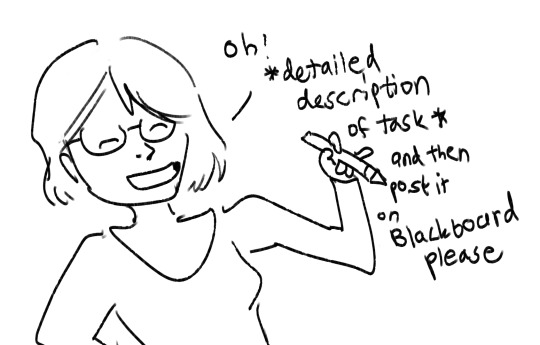


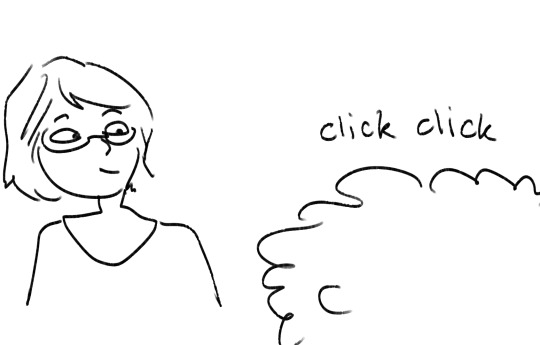

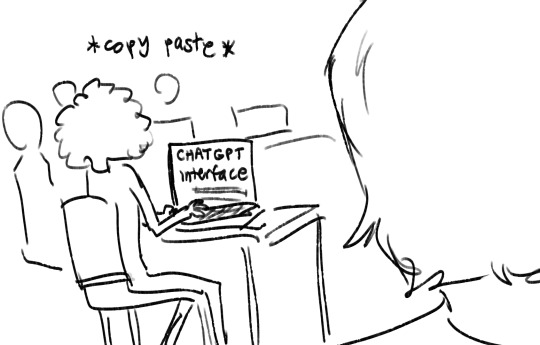

something that happened yesterday
224 notes
·
View notes
Text
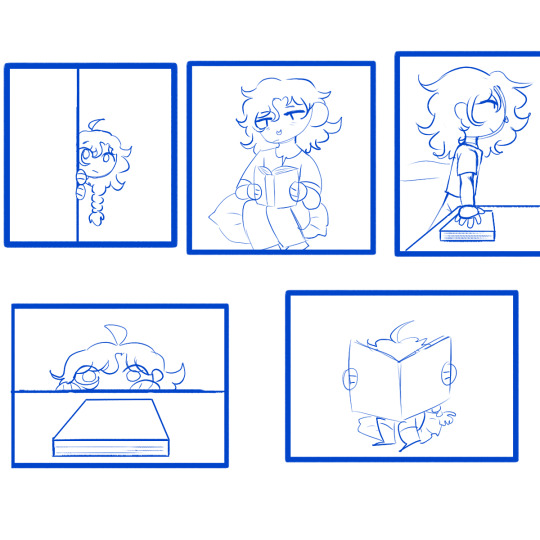



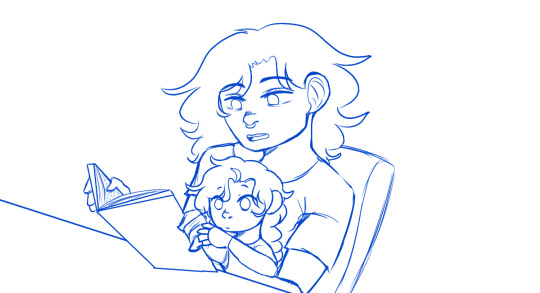
Hello i am not done about posting about my boy
Have a comic that ran itself through my head until I had to put it on paper--my lil guy cian (braid) asking his brother Emyr in his youth to read him a story totally did not steal this idea from the blog
and i wanted to practice my signs a lil bit and this was good practice between ISL (irsh sign language) and ASL (american sign language), if you spot something thats wrong please let me know! I want to know more about ISL so I can study it more!
#my art#digital art#my comic#digital comics#the kings hound#cian#if character#mc character#I did try and research isl signs a bit more but i couldnt find a whole lot??#there was this one website that had videos and stuff but you can tell it was made in the early days of the internet#i know asl a lot more and i know they share ~some~ signs but i know there is major differences#like the reading sign!#isl has your pointer going side to side to read your palm while asl has it going up and down#interesting aint it?#i think#again please correct me if im wrong#and i know#that when referring to someone or yourself its usually at the end then the start#but when i was taught in class my prof didnt correct us and hes a 70 year old deaf man#then again#he did some out dated signs#so honestly idk man#im tired#i'll stop rambling now
66 notes
·
View notes
Text
some math professor quotes
I just remembered about this draft post i made years ago during a semester when i had maybe the funniest professors ever. I guess now that it’s been a while since i’ve been out of uni it’d be fun to just post these
Algebra
it’s ok that i’m confused, i’m confused all the time
you can teach a monkey to memorize…well, nothing against monkeys, monkeys are amazing
pray that this is an isomorphism
(TA after realizing mistake) oh noooooo….all the other students….i told them the wrong thing…aaah shit
wow…spontaneous silence
can they smurf better
if you look at the solutions after trying a question only once or twice, it will break my heart
last-minute cramming will be about as useful as bringing your dog to the exam
Calculus
this fucker converges
(every time he writes a complicated equation) what the fuuuuu
fuck the one
you know what bfc stands for? big fuckin cube
mathematics is serious!! we don’t like laughter. no laughter allowed. stop laughing. even smiling is not allowed
(someone’s phone goes off) what was that? probably me
(some weird noise coming from outside) what was that? god is that you
e^x is god’s function. lnx is the devil’s function
*comes in talking in a russian accent*
if you don’t know what the dot product is then…you’re fucked
(after telling a story about experience working in a mental asylum) you may think i’m insane, but you haven’t seen what insane really is!! i’m perfectly normal
Analysis
½ is less than 1…somehow
oh, 5 minutes left…well, i don’t really have anything else i want to cover. actually maybe i’ll just write a definition *(whole class goes NOOOOO)* okayyy
(finding out there is 15 minutes left of class) oh wow. i thought this would’ve taken me more time to get through
(after playing around with some faulty blackboards) i’m scared for my life now
(after being stuck on his own proof) i’m going to take a quick look at my notes, which is already pretty embarrassing
(after making a gajillion mistakes on the board) i really need to learn to read before i talk
what do you call this in canada
(TA) *coughs* sorry i’m dying
(TA) somebody on the midterm wrote “i’m dumb” on this question. that’s pretty irrelevant because i’m dumb and i can do this question
#life stuff#the calculus professor has since passed RIP a legend#easily one of the most funniest and just overall great professors ever#also i think the algebra and analysis professors were the initial inspirations for jokull and schwarz#respectively#theres a couple of jokull comics out there that were directly inspired by stuff the prof said in class#anyway i was reminded of this post because i was trying to look for inspiration and i was like wait i remember this.
53 notes
·
View notes
Text
dovesso/prof wives (dovey/lesso/emma) commissions lately sjdnckdn
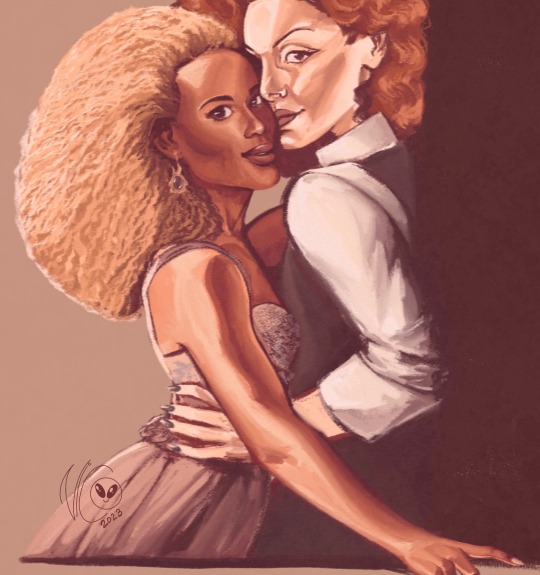


pleek commission me 🥹
#dovesso#dovey#lesso#emma#clarissa dovey#professor dovey#lady lesso#emma anemone#sge#school for good and evil#the school for good and evil#prof wives my fave throuple#nico stuff#fanart#digital art#painting#portrait
140 notes
·
View notes
Text
"All that matters is order vs chaos"
That quote summaries one of the most prominent themes of this season.
Sylvie and Renslayer stand in a direct opposition to each other. They literally have been defined by the show as the representations of order and chaos.
What is interesting is that Loki and Mobius seem to be a parellel of the same theme to a lesser extent. Loki tends naturally to be drawn to chaos but has learned to "take a look at the bigger picture" and let order rule from time to time. Mobius on the other hand gets naturally drawn to order but he appreciates and understand the need for chaos.
Both Renslayer and Sylvie judge Loki and Mobius for their duality. Sylvie seems rather disappointed in Lokis compliance with the TVA while Renslayer thinks that Mobius doesn't has it in himself to lead and make hard decision. She has called him more than once a "coward".
This makes me believe that the main conflict isn't necessarily between Loki/Mobius and He Who Remains, but rather between Sylvie and Renslayer and the Chaos they will wreck (again) on this universe.
Also they clearly have established different concepts and characteristics for this "chaos vs order" theme and its reasonable to expect that it's going to find some sort of conclusion at the end of this season, depending what type of story the creators want to tell. It will defiently be interesting to see what they do with it.
#loki#Lokius#Sylvie#Mobius#Sylkie#Spoilers for episode 3#I will probably write a bit more about all of this later#There is a lot to analyze#Finally I can use the stuff I learned at uni#My semiotic prof would be proud of me
77 notes
·
View notes